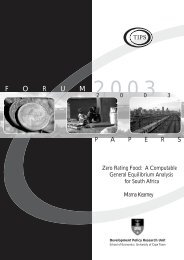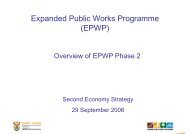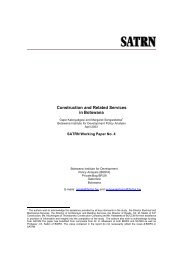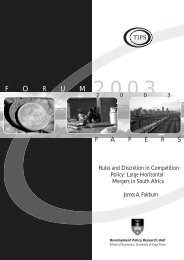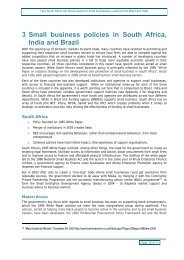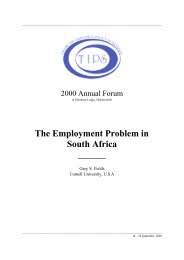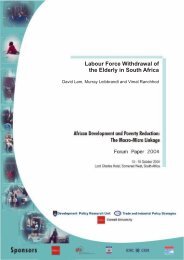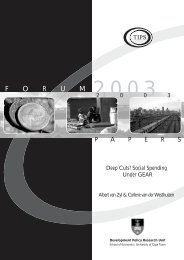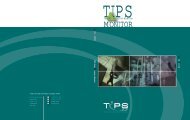Create successful ePaper yourself
Turn your PDF publications into a flip-book with our unique Google optimized e-Paper software.
TIPS<br />
F O R U M<br />
20032 0 0 3<br />
P A P E R S<br />
Changing ICT Sector In The<br />
SA Economy<br />
<strong>Esther</strong> Netshivhongweni<br />
Development Policy Research Unit<br />
School of Economics, University of Cape Town
CHANGING ICT SECTOR IN SA ECONOMY<br />
1. Executive summary<br />
The paper attempts to give an operational definition of the ICT for the purpose of<br />
arguments presented in this paper.<br />
The paper addresses the changing ICT sector as discussed in various studies. Factor<br />
such as salaries, gender, age, qualifications, size of the company and race will be<br />
analysed to assess their economic impact in ICT.<br />
This paper addresses the current status of BEE in South Africa. This section discusses<br />
the phases of ICT Charter and their meaning in the ICT sector. It also looks at some<br />
burning issues facing ICT sector in the implementation of BEE. Barriers to women<br />
development in the ICT sector are discussed.<br />
One of the interesting parts of this paper is the section that addresses cyber crime in<br />
South Africa. In this discussion the paper raises a lot of challenges that South Africa<br />
is faced with, in dealing with “mouse and keyboard” crime.<br />
The argument on the relationship between ICT and poverty is discussed. This looks at<br />
factors such as agriculture, culture and governance, education and health.<br />
“Let us fight for e-ForAll for competing economy”<br />
2. Definition of ICT<br />
What is ICT? It includes the following sub-sectors as presented in the ICT charter :<br />
- Information Technology<br />
- Telecommunications<br />
- Communications<br />
- Electronics<br />
- Multi-media<br />
Is it reality that this sector is changing? If it is changing, which direction is it taking? I<br />
do not know. You are the best person to answer this question.<br />
ICT started some centuries ago to achieve different objectives. In South Africa we<br />
used “ngoma” in one of the African official languages, i.e drum in communicating<br />
with other people who are far from us. We also used ancestors to communicate with<br />
our bread winners who were working far away from home, in different cities. One of<br />
the objective of this communication was for sustainable development of the families.<br />
Where are we today?<br />
1
3. The current ICT sector in South Africa<br />
1. Salaries in ICT sector<br />
There has been a myth that SA ICT skilled labour is being drained to US. It was<br />
believed that the cause of this brain drain was no-competitive SA salaries compared to<br />
US. This is true not for all ICT skills. Stephen Whinford (2003) indicated that SA ICT<br />
sector is paying the same amount of salaries as SA would pay to local programmers<br />
for the same job. SA has top local programmers, though they cannot be seen as the<br />
cheapest compared to US and Indian.<br />
The challenge in SA is to attract South Africans who are working in ICT abroad to<br />
come back home and support SA economy. May be South Africa is overgeneralizing<br />
on the number of SA citizens who are working abroad. How many South Africans are<br />
leaving the country from this sector? The salary survey done by IT Web (2003) found<br />
that 16% of the respondents were intending to leave the country last year with 24%<br />
saying they might leave. Of that number 38% were destined for the UK, 15% for the<br />
US 12% for Australia and 9% for Europe.<br />
It is not only the salary issue that causes this brain drain. As a country it is important<br />
to consider other causes such as economic history of SA, stability of the country in<br />
terms of economic trends, technological changes and other related factors.<br />
Trade and Industry Minister was quoted as saying that South African abroad could<br />
provide much more needed expertise and that government would prefer these posts to<br />
be filled by South Africans, (Tracy Burrows, 2003). This includes the IT industry.<br />
Competitive salaries seem to be a cause of concern to those South Africans who are<br />
working abroad. What is a competitive salary? Labour economists have different<br />
understanding in this concept. They refer to it as salary higher than the average salary<br />
in the market. On the other hand, some would see competitive as the above average<br />
salary in the sector, in this case ICT sector, they complicate the matter by perceiving a<br />
salary as a function of effort, qualifications, skills and set targets.<br />
The research that was conducted by IT Web (2003) shows that there is a slow growth<br />
rate of salaries that is expected in IT sector. Even though professionals in this sector<br />
hope that salaries will at least keep up with inflation.<br />
There are number of factors that have an impact in salaries in the ICT sector. Factors<br />
such as gender, race, age, qualifications, experience, skills, size of the company and<br />
working hours are important in determining the scales of salaries. The salary survey<br />
done by IT Web (2003) indicated that :<br />
Gender<br />
- Male reported the average salary growth of 2.8% higher than last year’s,<br />
i.e. R22 090 as compared to R21 492.<br />
- White females reported salary at 4.8% higher than that of last year’s<br />
2
- It seems like there are difference between male and female salaries. If this<br />
is the case in the sector, why and how to overcome this? Is this<br />
discrimination?<br />
Age<br />
The survey found that age and experience go hand in hand. In the ICT sector<br />
those who are in the 46 to 50 years of age are employees who are earning<br />
highest salaries. Is it important to attach the value of salary to the age? Is it<br />
true that people who have been in the sector for many years should be<br />
rewarded for this? Is this a true definition of experience? These are some of<br />
the issues ICT sector and SA as a whole should consider when dealing with<br />
the relationship between age, experience and salary.<br />
Qualifications<br />
From the survey findings, salary scales in general in this sector match the<br />
qualifications. Meaning that the higher the qualifications the higher the salary.<br />
What is surprising from these findings is the fact that technikon diploma<br />
holders are earning less than those with matric. Should the sector attach the<br />
value of salaries to qualifications, and why?<br />
Size of the company<br />
It makes sense to say the bigger the company, the higher the salaries of its<br />
employees. In this sector it was found that employees working for small<br />
companies with less than 10 staff earn slightly higher salaries than those<br />
employed by the large corporates with over 5000 employees. Is there a<br />
relationship between size of the company and salary scales? How does the<br />
sector view this relationship?<br />
Hours of work<br />
In the ICT sector, do companies calculate the monetary value of hours that the<br />
employees work? Is this easy to apply across all ICT fields? From the findings<br />
employees who work 10 hours a day earn slightly higher, more that R26 000 a<br />
month.<br />
Race<br />
Does the ICT sector still experience the challenge of different salary levels in<br />
respect of race? If this is true, is the sector prepared to deal with the challenge,<br />
how and when will the sector resolve this? The survey found that the low<br />
number of PDI’s in the sector in top management earn low salaries.<br />
Considering the discussion above, it follows that all the factors mentioned<br />
above are linked to SA economy. It is therefore important to workout solutions<br />
to the above challenges. When opening the discussion of salary being a<br />
function of all factors discussed above, one tempted to talk about an argument<br />
3
among salary scales, economy and productivity. Is there any relationship<br />
among these factors?<br />
4. BEE in the ICT sector<br />
What is BEE? It is not an easy concept to define. It embraces involvement of blacks<br />
in the South African economy as whole. A further question will be the scope of<br />
blacks. This is defined by the SDA and EEA.<br />
After apartheid era South Africa finds itself in situations where there is a huge<br />
imbalances of the distribution of wealth. This is a challenge that needs to be faced and<br />
rectified.<br />
Different strategies have been developed to address this challenge. These include<br />
legislation in skills development, gender discrimination, BEE and many others. These<br />
strategies are also helping South African democracy to grow and compete with that of<br />
other countries.<br />
In its struggle to strengthen its democracy, South Africa look at various economic<br />
sectors including ICT. ICT charter is in its way to rectify economic problems of the<br />
country. In this charter BEE is seen as one of the key success to the ICT sector. Why<br />
ICT charter? This is the document that will help in the facilitation and monitoring<br />
process of implementing BEE in ICT sector.<br />
Is South Africa as a country winning in addressing BEE in the ICT sector?<br />
In the ICT charter, there are three phases to the implementation of BEE in the<br />
sector. These phases are :<br />
- Phase one (1994 –1999), experimental and touch of the realities and<br />
challenges. Brian Khumalo, CEO of Leaders Unlimited sees this phase as<br />
the SWOT analysis phase with establishment of BEE Commission, BEE<br />
procurement policy, commencement of privatisation and establishment of<br />
various organisations such as Ntsika, UYF, and many others.<br />
- Phase two (1999 – 2003), This a time of debates from government<br />
representatives, representatives of the ICT sector dominated by the issues,<br />
elitism and enrichment versus real empowerment. Brian explains this is<br />
phase as Strategic objective and goal setting era starting in 2002. This the<br />
time of the development of ICT charter and debates to achieve<br />
implementation of the BEE in ICT.<br />
- Phase three (2004 – onwards), era of cooperation from the industry and<br />
measurability of BEE indicators. Brian explains this as an implementation<br />
era. This is the time when the sector will be monitored by legislation on<br />
compliance of the BEE. During this time the sector will be serious in<br />
implementing BEE. Employers who resisted and put blind eye during the<br />
first and the second phase will be running around to ensure compliance.<br />
4
The draft document of the ICT charter covers various issues that will assist in<br />
implementation. These include key indicators/targets of the BEE in ICT, scope of the<br />
sector, linkage to legislative process, inclusivity, etc.<br />
It is difficult to discuss success of the BEE strategy in ICT. From the beginning of<br />
phase two BEE indicators will start flashing. This will be the good measurement level<br />
of the strategy. If South Africa wins in implementing this, how will this benefit the<br />
economy of the country?<br />
Some of the challenging issues raised in the BEE conference on 13 August 2003,<br />
Gallagher Estate Midrand<br />
- No BEE happening , no commitment from industry, 10 years now<br />
- Seta’s are working, sector is not commitment<br />
- Is the industry implementing SDA and EEA?<br />
- Are these companies submitting EE report to DOL?<br />
- This a delay, now what?<br />
- Process is too slow and frustrating to BEE companies<br />
- Does the industry need stick from the government?<br />
- Are local and multinational companies acting on BEE, i.e. ownerships and<br />
other related aspects<br />
- Nothing happening only roadshows<br />
Women in ICT<br />
ICT sector has been seen as a male-dominated sector. South African understood this<br />
in such a way that female felt embarrassed by working for this sector. Today South<br />
African women are starting to understand working in this sector.<br />
Even though women are challenging this sector, there are still a number of concerns<br />
that are barriers to working women including women in ICT. Some of these concerns<br />
include :<br />
- Management style in the sector. Research by van der Merwe and Stander<br />
(2002) revealed that about 60% of the women in ICT are concerned about<br />
the management style in this sector. Can this be an excuse for woman not<br />
applying positions in this sector? Which style of management most<br />
concerns women in the workplace? Is this an overall management style<br />
applied to women across all economic sector?<br />
- Training and re-skilling opportunities. Women are claiming that they are<br />
not given training and re-skilling opportunities in this sector. Is this true?<br />
Do they really have required educational background? What should be<br />
done to address this?<br />
- The dual roles of women. Women have family responsibility as well as<br />
work responsibility. Women see this as stumbling block to their career<br />
development. In their study, van der Merwe and Stander found that 52% of<br />
the women in ICT blame family commitments as challenge in their career<br />
development. There has been a debate among South Africans on 50/50<br />
5
etween married couples. Is this working for this country? If it is working,<br />
why women are still pin-pointing famiy commitments as barriers to career<br />
development? What is the impact of this in SA economy?<br />
- Women claim to have higher administration workloads than men. The<br />
research found that about 51% of the respondents are complaining that<br />
they cannot succeed in ICT sector because they have more workplace<br />
administration job than men.<br />
There number of challenges that women are faced with both inside and outside their<br />
work environment. If South Africa believes that women can also contribute much on<br />
its economy, all these challenges should be dealt with in order to increase economic<br />
growth. May be a question will be, do these challenges have an impact on SA<br />
economy, if yes, how?<br />
Some of the burning issues that were raised in the BEE conference13 August 2003,<br />
Gallagher Estate Midrand that also affect women are :<br />
- Assess and identify suitable BEE partners on clear criteria<br />
- Monitor Boards of BEE performance<br />
- Sustainable BEE strategy<br />
- Non-job creating empowerment vs job-creating empowerment<br />
- Facilitate transfer of ownership vs self created ownership<br />
- Capital focused empowerment vs knowledge based empowerment<br />
- Local focus vs global focus<br />
The question is if these challenges ca be implemented, is there going to a more<br />
comprehensive, user friendly strategies to attract women in ICT? Is there any<br />
relationship between women in ICT and SA economy?<br />
5. ICT crime and the economy<br />
Message to South Africa. Technology is dominated by two types of people: those<br />
who understand what they do not manage and those who manage what they do not<br />
understand, Putt’s law.<br />
South Africa has been faced with different types of crime such as women and children<br />
abuse, family violence and others. These are seen as well-known crimes which may<br />
also have an impact in the growth of SA economy. As other developing and<br />
developed countries SA has entered an information world. Information world, like<br />
any other challenge, brings with it both SWOT (Strength, Weaknesses, Opportunities<br />
and threats).<br />
ICT fraud is not challenging only South Africa, but even other countries around the<br />
world are experiencing this problem. But how can the multinationals agreed on cyber<br />
crime? John Doolan (2003) asked related questions on trying to alert people on this<br />
complicated type of crime. Some of these questions where :<br />
6
- When is a crime not a crime?<br />
- What constitute a cyber misdemeanour?<br />
- How do you provide proof of fraud committed via a mouse and a<br />
keyboard?<br />
The world spent countless resources in fighting this crime. It is such a difficult<br />
crime to deal with. Research and development have been conducted to produce<br />
powerful products that can help to deal with this crime. In developing these<br />
products, the problem is the pace in which the ICT sector changes. It becomes<br />
important to differentiate cyber crime and other types of crimes. The issues here is<br />
not populated the whole sector with police unlike in dealing with other types of<br />
crimes. The underlying challenge is as follows :<br />
The degree of cyber crime = The pace of technological change<br />
The pace of technology obsolesce<br />
If scientists were to work out some calculations around this equation, it follows that<br />
the cyber criminals should always behind technology in order to curb with this crime.<br />
Is that possible?<br />
E-banking was starting to be more user friendly for business people and busy South<br />
Africans who do not have time to go to the banks. July 2003 will not be forgotten for<br />
its shocking event where cyber crime attacked some of South African banking<br />
institutions. During this time bank clients asked many questions about security over<br />
their monies. John Doolan (2003) talked about the paradigm based on traditional<br />
banking values that “We will look after your money”. But after you have signed some<br />
cheques and/or taken cash from the ATM or teller, it is your problem. Who must<br />
protect these monies?<br />
The law and cyber crime<br />
“Does South Africa has enough legislation to fight this type of crime? In South Africa<br />
the process of combating cyber crime is under way”, Deloitte & Touche (2003). In the<br />
analysis of cyber crime, three questions were raised by the South African Law<br />
Commission Discussion Paper 99, Project 108, Computer-Related Crime: Preliminary<br />
Proposals Reform in Respect of Unauthorised Access to Data and Software<br />
Applications and Related Procedural Aspects. These questions are :<br />
- Whether the authorised accessing of computers and unauthorised<br />
modification of computer data and software applications should attract a<br />
criminal sanction? Is it justified to sanction these actions with criminal<br />
penalties?<br />
- If it is accepted that they should lead to criminal liability, is it necessary to<br />
create new offences to criminalise these actions?<br />
7
- What provision should be made for the investigation and prosecution of<br />
such an offence, given the unique nature of electronically stored<br />
information?<br />
All the above questions raise constraints in dealing with cyber crime. Currently there<br />
are crime related acts that are helping South Africa to deal with crime. These include :<br />
- Copyright Act of 1978<br />
- Trespass Act no. 6 of 1959<br />
- Adjustment of Fines Act no. 101 of 1991<br />
- Criminal Procedure Act no. 51 of 1977<br />
Are these legislation enough and relevant in dealing with Cyber crime? How recent<br />
are they in addressing fast changing technology? Many proposals and discussion<br />
paper to legislation have been laid down in an attempt to address this crime. Where<br />
are we, do we currently have direction in curbing this crime?<br />
It is interesting that the working paper in Computer-Related Crime: Preliminary<br />
Proposals Reform in Respect of Unauthorised Access to Data and Software<br />
Applications and Related Procedural Aspects, considers the pitfalls in a number of<br />
different countries including USA, Canada, UK, Singapore, Australia and European<br />
Community, hence the equation of cyber crime as presented above.<br />
The targets for this working paper were :<br />
- Criminalisation of unauthorised access to computer data and software<br />
applications. This involves aspects such as criminal action, access,<br />
unlawfulness, culpability and knowledge of unlawfulness<br />
- Unauthorised modification of applications or data in computer system.<br />
This encompasses facets like trafficking in computer passwords,<br />
interference with use of computer systems, search and seizure, evidence as<br />
well as territorial jurisdiction.<br />
If South Africa can address most of the cyber crime possibilities, it will be a good<br />
starting point in dealing with this crime. This crime requires fast moving<br />
technological environment where country can learn, copy, modify and implement<br />
other countries’ technological experiences.<br />
The impact of cyber crime in SA economy<br />
To addressing this relationship, it is important to look at the following factors<br />
- Perception of international investors in local cyber crime<br />
- Local technological change<br />
- Understanding technology and its importance<br />
- Measuring the impact of cyber crime in SA economy<br />
- The relationship among technology and factors such as political,<br />
environment, economical, social and legal.<br />
8
The impact of cyber crime in SA economy is a topic on its own. It requires continuous<br />
detailed studies and committed researchers to come up with informed findings and<br />
recommendations that can help South African to take informed decisions.<br />
6. The relationship between ICT and poverty<br />
It is important to define poverty before one looks at the relationship between ICT<br />
and poverty. It is defined in various ways. For the purpose of this discussion the<br />
definition of Adeya (2003) preferred, where poverty is defined in two different<br />
ways, firstly, absolute poverty – refers to subsistence below the minimum and<br />
socially acceptable living conditions. Secondly, relative poverty – compares the<br />
lowest bracket of a population with the upper bracket.<br />
Is there any relationship between ICT and poverty? There have been a heated<br />
arguments at various conferences on the relationship between ICT and poverty.<br />
“The poor are excluded from much of the world’s information and no one has<br />
begun to outline a solution to the problem”, said Wresch (1996:58). Is this<br />
exclusion resulting in poverty? How?<br />
Adeya (2003) recommends e-ForAll for the following three principles :<br />
- ICTs has the potential to improve the livelihoods of low income people by<br />
reducing by reducing costs of providing services to the poor<br />
- The policy would put ICTs at the services of all in the society by<br />
encouraging concrete programmes to open opportunities for the poor and<br />
empower them<br />
- ICT development for socio-economic change needs huge state support and<br />
financing, but ICT initiatives to combat poverty must be suited to the low<br />
productivity environment in which they are applied.<br />
Heeks (1999) addressed the relationship between ICT and poverty on his study,<br />
and he said, “The poor knowledge to access, assess and apply existing information<br />
and need resources for action more than they need access to new information; the<br />
poor need access to new, locally-contextualised information more than access to<br />
existing information from an alien context; the information needs of the poor may<br />
be met by more informal information systems than by formal ICT-based systems;<br />
the poor will reap the fullest benefits of ICT only when they know and control<br />
both the technology and related know-how”.<br />
Before one starts addressing this relationship, it is important to know the current<br />
status of SA in accessing ICTs.<br />
9
Percentage of households with selected household goods in working condition - October<br />
2001<br />
Radio 73,0<br />
Television 53,8<br />
Computer 8,6<br />
Refrigerator 51,2<br />
Telephone in<br />
24,4<br />
dwelling<br />
Cell-phone 32,3<br />
0 10 20 30 40 50 60 70 80<br />
(Source Stats South Afrca, Census 2001<br />
• Nearly three-quarters of households in the country had a radio, well over half had<br />
a television, and just over half had a refrigerator. At the other end of the scale,<br />
fewer than 10% had a computer<br />
• This graph masks differences between population groups. For example, the<br />
much-spoken of “digital divide” is evident in the fact that less than 2% of Africanheaded<br />
households had a computer, as opposed to 46% of white-headed<br />
households.<br />
Similarly, only 12% of African-headed households had a telephone in the home,<br />
as against the national total of 24% shown in the graph. This may in part explain<br />
the popularity of cell-phones; twice as many African-headed households had cellphones<br />
(25%) as had fixed-line telephones.<br />
Most arguments around poverty focus on insufficient nutrition, inadequate shelter and<br />
other related aspects. It is only now that people start looking at lack of access to ICT<br />
as an element of poverty.<br />
The relationship between ICT and poverty can be analysed by looking at various<br />
factors that constitute a person’s living. For the purpose of this discussion, the<br />
following factors will be looked at :<br />
- Agriculture<br />
- Culture and governance<br />
- Education<br />
- Health<br />
In order to analyse the relationship between ICT and poverty, the paper will consider<br />
the relationship between ICT and the above-mentioned factors.<br />
10
ICT and agriculture<br />
Many of South African people stay in the rural areas where they depend on farming to<br />
earn a living. For this farming to produce enough for the farmers, workers and society<br />
as a whole, it needs effective communication. Richardson (1998) refers this to a<br />
‘communication for development’ approach for catalysing internet services for rural<br />
stakeholders, an approach that began with the needs of people rural and agricultural<br />
communities.<br />
It is vital that South African farmers have access to internet connection, telephones<br />
and fax lines in order to market their products to local and overseas markets. Access<br />
to ICT by farmers can also ease communication means between local and overseas<br />
farmers. It is important for farmers to get e-learning in order to learn on how other<br />
farmers are dealing with different farming challenges.<br />
South Africa is also encouraging women to get more involved in farming as a career.<br />
For these women to succeed in farming as a career, they must be able to access ICTs<br />
as a marketing instrument.<br />
The relationship between ICT and agriculture has proved to be beneficial to Indian<br />
women in Asia. This was revealed in a study that conducted by UNDP (2000) in<br />
India. The study was evaluating how information technologies have been used in<br />
poverty eradication especially in connection with the needs of women farmers. The<br />
study wanted to determine the need to provide women farmers with networked<br />
computers with internet access. It looks at a number of issues including information<br />
concerning agronomic practices and farming methods, information on to access and<br />
use new technologies, market new and agricultural commodity prices, weather<br />
predictions and rainfall patterns, recommended crops for the season as well as<br />
information on meetings and workshops on relevant issues.<br />
It is argued that this kind of study can benefit women as women farmers generally<br />
remain isolated from the mainstream of agricultural training, research and<br />
development, partly due to limited literacy levels.<br />
Are the above the types of issues need to be looked at in order to benefit South<br />
African women farmers? Are South African women farmers really need an<br />
assistance in accessing ICT? Are these the kinds of communication problems that<br />
are affecting all South African farmers irrespective of gender? Looking at the<br />
technological and economic development of this country, is this the right time to<br />
face all these farming ICT issues?<br />
11
ICT, culture and governance<br />
There are people who believe that cultural beliefs are hindrance to the adoption of<br />
ICT in many rural areas. These include Janczewski (1992), Rycken (1995), Manji et.<br />
Al. (1998),Qureshi (1998), Morales-Gomez & Melesse (1998) and Hasan & Dista<br />
(1999). Is this belief true? This might be caused by about ICT gap that occurs as a<br />
result of the vulnerability of people to ICT, and the time taken for generations to<br />
access ICT. It follows that there is an‘ICT-cultural gap that needs to be addressed.<br />
The question will be how to deal with this challenge.<br />
“If you are to conceal information to people, publish and give out those booklets”.<br />
This is true because people are lazy to read. It was also proved by Ryckeghem (1995)<br />
who said many Africans would prefer to consult colleagues or friends rather visit a<br />
library or documentation centre. He argued that how does one transform such an<br />
information culture, with IT, or internet?<br />
Is this the same ICT-culture problem that South Africans are experiencing. There<br />
might be many reasons underlying this problem. Some of these problems are lack of<br />
ICT access i.e. what Maji et al (1998) calls ‘information starvation’, acceptance to the<br />
level of poverty that people are living with, the flowing of ICT information to the<br />
people and resistance to change.<br />
Do South Africans, who do not have access to ICT, see this as ‘discrimination on<br />
access to information’. South African constitution addressed the right of access to<br />
information. Section 32. (1)of the consitutition says “ Everyone has the right of access<br />
to<br />
a. any information held by the state; and<br />
b. any information that is held by another person and that is required for the<br />
exercise or protection of any rights”.<br />
This is a challenge to South African government and the ICT sector in ensuring that<br />
all South African are accessing any ICT information in this country. How a country<br />
can manage this challenged? Myers (1998) found that only a small percentage of the<br />
sub-Sahara Africa’s population has access to ICT, and this denies them access the<br />
ability to realize their rights. He concludes by saying IT (with reference to computers)<br />
is thus capable of helping African citizens realise their basic rights by transmitting<br />
information on relevant issues and enhancing their knowledge in relation to new<br />
systems and programmes that can benefit the community and the nation as a whole.<br />
There are also ICT research gaps that need to be conducted in order to understand the<br />
levels of ICT literacy in South African population. This information is of importance<br />
for the decision makers and policy developers to base their decisions on. If the issues<br />
of ICT, culture and governance can be managed, is South African economy going to<br />
reap the fruits?<br />
12
ICT and education<br />
There is no doubt that ICT is important and can be non-negotiable to a country’s<br />
education system. Rathgeber (200) argue that an illiterate or poorly educated people<br />
cannot wholly absorb ICTs. From this argument, it follows that the country should<br />
afford to introduce ICT in school curriculum so that children learn how to use these<br />
technologies from an early age.<br />
If the whole population can be ICT literate, is the country going to benefit from this?<br />
There is no argument that this could be tabled on the relationship between ICT and<br />
economy. ILO (2001) views ICT as a meta-technology revolving around life at work<br />
in the information economy, characterised by key issues such as change management<br />
practices, the nature of the employment contract, and the quality of work.<br />
The question that has been raised is whether the information economy will be a jobs<br />
economy. Some people would argue that in a highly technological country people jobs<br />
tend to be substituted by technology. Is this true and can this be seed as affecting the<br />
country’s economy negatively? Of course this can result in retrenchment and<br />
unemployment will increase and as a result economic growth will be affected. It could<br />
be argued that technology can also increase the country’s economic growth<br />
There are important lessons to learn the Hawkins (2002) writes and these are vital to<br />
be considered by policy makers, business and community leaders when planning to<br />
incorporate the internet in the educational process. These lessons are :<br />
- Computer Labs in developing countries take time and money, but they<br />
work<br />
- Technical support cannot be overlooked<br />
- Non-competitive telecommunications infrastructure, policies, and<br />
regulations impede connectivity and sustainability<br />
- Lose the wires (basically wireless technology is most effective for<br />
connecting schools in developing countries)<br />
- Get the community involved<br />
- Private-public sector partnerships are essential<br />
- Link ICT and education efforts to broader education reforms<br />
- Training, training, training (Basically that the professional development of<br />
the teachers sits at the heart of any successful technology and education<br />
programme<br />
- Technology empowers girls<br />
- Technology motivates students and energises classrooms<br />
Some of these lessons are important to know, especially if the country is in the<br />
process of implementing ICT curriculum at schools.<br />
ICT and Health<br />
There have been arguments on HIV/AIDS challenges faced by African countries.<br />
Scientists and policy makers argue that people who do not have access to information,<br />
13
do not have knowledge on HIV/AIDS issues. This is the reason why some of the<br />
African countries are spending big amounts of money on HIV/AIDS awareness<br />
programs.<br />
Discoll’s (2001) views one of the roles of ICTs being addressing the challenge of<br />
HIV/AIDS. If people can access HIV/AIDS related websites, they can benefit a lot on<br />
HIV/AIDS issues.<br />
If we were to look at ICT as defined at the beginning of this paper, it is also important<br />
for people to have access to TVs as one of the method that can be used to deal with<br />
the challenges of HIV/AIDS.<br />
Is there a need to spend resources on ICTs in order to benefit those that need<br />
information on HIV/AIDS? What about the relationship between ICTs as a method to<br />
address HIV/AIDS challenges, and the economy? If the country is to spend resources<br />
on ICTs to deal with HIV/AIDS, how does this improve economic status of the<br />
country?<br />
7. Conclusion<br />
“Are the poor still excluded from much of the world’s information?” said Wresch<br />
(1996). The answer to this is “Yes”.What is the world doing about this? It is<br />
important for a country to have e-ForAll in order for a society to participate in the<br />
economic activities.<br />
14
8. References<br />
1. Adjustment of Fines Act no. 101 of 1991<br />
2. Adeya, C. (2003) ICT and Poverty : Literature review, IDRC/Acacia,<br />
February 2003<br />
3. Copyright Act of 1978<br />
4. Criminal Procedure Act no. 51 of 1977<br />
5. Employment Equity Act 55 of 1998<br />
6. ICT Charter<br />
7. Heeks, R. (1999) ‘Information and Communication Technologies, Poverty<br />
and Development’. Development Informatics Working Paper Series, Paper<br />
No. 5, June 1999<br />
8. Hasa, H. and & G. Dista (1999) ‘The Impact of Culture on the Adoption of<br />
IT: An Iterpretive Study.’ Journal of Gobal Information Management, 7, no.<br />
1, pp. 5-15<br />
9. Information Industry Quarterly : Turning Business into Business Value<br />
(2003), Cape Media Corporation, Cape Town<br />
10. IT Web,BEE in IT Conference.<br />
http://www.itweb.co.za<br />
11. Janczewski, L. (1992) “Factors of Information Technology<br />
Implementation in Under-developed Countries: Examples of West Africa<br />
Nations”. In S. Palvia et al (eds) (1992) The Global Issues of Infromation<br />
Technology Management. Herahey PA: Idea Group Publishing , pp. 187-211.<br />
12. Khumalo, B. (2003), BEE in IT Conference, 13 August 2003, Gallagher<br />
Estate, Midrand South Africa<br />
13. Maji , F. et. Al. (1998) ‘Enhancing the Capacity of Human Rights and<br />
Advocacy Organisations in Southern Africa’. IDRC/Acacia , Dec. 1998.<br />
http://www.idrc.ca/acacia/04053/sum.html<br />
14. Morales-Gomez, D & M Melesse (1998) ‘Utilising Information and<br />
Communication Technologies for Development: The Social Dismension.’<br />
15. Myers, J. (1998) ‘Human Rights and Development: Using Advance<br />
Technology to Promote Human Rights in Sub-Sahara Africa.’ Case<br />
Western Reserve Journal of International Law, 30, no.2/3, pp. 343-371<br />
15
16. Qureshi, S. (1998) ‘Fostering Civil Associations in Africa through<br />
GOVERNET: An Administrative Reform Netwo rk.’ Information<br />
Technology for Development, No. 8 (1998), pp.121-136<br />
17. Richardson, D. (1998) The first Mile of Connectivity : Advancing<br />
Telecommunications for Rural Development Through Participatory<br />
Communication. FOA in collaboration with the Snowden Program of the<br />
University<br />
http://www.fao.org/WAICENT/FAOINFO/SUSTDEV/Cddirect/Cdan0025.ht<br />
m<br />
18. Ryckeghem, D. V. (1995) ‘Information Technology in Kenya: A Dynamic<br />
Approach.’ Telematics and Informatics, Vol. 12, No. 1, pp. 57-65<br />
19. Skills Development Act 97 of 1998<br />
20. South African Law Commission Discussion Paper<br />
21. South African Constitution<br />
22. Trespass Act no. 6 0f 1959<br />
23. Wresch, W. (1996) Disconnected : Haves and Have-nots in the information<br />
age. New Bruswick: Rutgers University Press<br />
24. UNDP (2000) ‘Examples of Use of IT in Poverty Eradication in UNDP<br />
India Community Mobilisation’. UNDP-GOI Food Security Programme.<br />
http://www.undp.org.in/ictpe.htm<br />
25. Van der Merwe, N. & Stander, A. Women in IT : A South African<br />
Perspective, University of Cape Town, South Afrca<br />
26. Rathgeber, E.M. (2000) ‘Women, Men, and ICTs in Africa: Why Gender is<br />
an Issue.’<br />
16
27. ILO (2001) World Employment Report 2001: Life at Work in the<br />
Information Economy. ILO: Geneva, 2001<br />
28. Hawkins, R. J. (2002) “Ten Lessons for ICT and Education in the<br />
Developing World.” In CID (Centre for International Development) (2002)<br />
The Global Information Technology Report 2001-2002: Readiness for the<br />
Networked World . Oxford : OUP, Chapter 4<br />
29. Driscoll, L. (2001) ‘HIV/AIDS and Information and Communication<br />
Technologies.’ Report for the IDRC, Nov. 2001.<br />
30. Stats South Africa, Census 2001<br />
17



